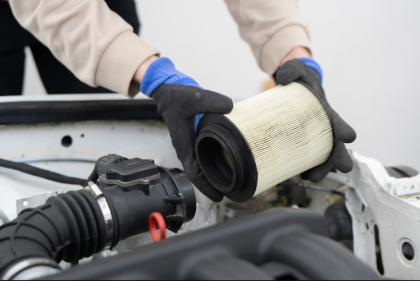INDEPENDENT DEALER
Saint George, UT | (208) 589-4660
OUR BLOG
Ready to keep your tough machines running longer and stronger? Master heavy-duty equipment maintenance with expert tips from SGT. Airborne in Manalapan Township, NJ.

Heavy-duty equipment powers industries like construction, mining, and agriculture, driving productivity and progress. But even the mightiest giants can crumble without proper care. One skipped maintenance check could lead to costly breakdowns, dangerous accidents, or a work site coming to a halt.
This post explains why heavy-duty equipment maintenance isn’t just a task but a necessity. We’ll cover the key steps, benefits, and best practices to keep your machinery in top condition.
For unmatched engine protection, get AMSOIL from SGT. Airborne in Manalapan Township, NJ. Call (732) 288-4303 or visit AMSOIL online to gear up for your next job.
Why Skipping Maintenance Costs You More Than You Think
Too many contractors learn this lesson the hard way. You buy a $200,000 bulldozer, then try to save money by skipping oil changes or using cheap fluids. Six months later, you're faced with a repair bill that makes your accountant cry.
Smart operators know better. Following disciplined fleet maintenance saves money in the long run. This is not just about small savings. It is about protecting your profits from avoidable repairs and extending the life of your equipment.
Skipping maintenance is like gambling with your machinery. You might avoid problems for a while, but when luck runs out, the costs are high. Downtime, emergency repairs, and unhappy clients follow. The choice is clear: pay a little now or much later.
The Big Four: What Your Equipment Really Needs
All heavy equipment relies on four key systems to run smoothly: the engine, hydraulics, transmission, and cooling system. If you ignore any of these, you could face expensive repairs and unexpected downtime. But with regular care, your machine will keep running strong for years to come.
Engine: Tough Yet Vital
Your engine is the heart of your operation, and if you take good care of it, it will keep working hard for you. The secret is using commercial-grade synthetic oil for your regular changes. Unlike standard oil, synthetic oil holds up better in extreme heat and cold, which means:
- You can go longer between oil changes
- Your engine stays protected even when you're working it hard
- Better performance in tough conditions
Hydraulic System: High Pressure, Low Tolerance
Hydraulics are less forgiving than engines because they operate under extreme pressure. When hydraulic fluid gets dirty or breaks down, expensive pumps and cylinders fail quickly. Here's how to stay ahead of problems:
- Schedule regular fluid analysis to catch issues early
- Replace fluid before it becomes contaminated
- Most problems show up in testing before you notice performance issues
Transmission: Built for Stress, Needs Quality Care
Your transmission and drivetrain endure constant stress from varying loads and operating conditions. Besides meeting manufacturer specifications, using commercial-grade lubricants provides the following benefits:
- Smoother shifting throughout your equipment's life
- Better fuel efficiency
- Longer component life that more than covers the cost of premium lubricants
The takeaway? Proper maintenance prevents costly breakdowns, keeping your operation running smoothly.
Protect your cooling system with the power of AMSOIL Heavy-Duty Antifreeze & Coolant. Browse AMSOIL’s full range of car care products online, and call SGT. Airborne in Manalapan Township, NJ, at (732) 288-4303 for quick service and advice.
Safety Isn't Negotiable
Maintenance is not just about saving money; it is about protecting lives. When machines fail, the results can be deadly. Hydraulic leaks, brake failures, or structural damage can seriously injure or kill operators. That is why regular safety inspections and proper tightening of critical parts are essential.
Make safety part of your daily routine. Train your operators to do quick pre-operation checks and to spot anything unusual. When they know what is normal, they can catch problems early before they turn into major failures. Just a few minutes of daily inspection can prevent injuries and keep your team safe on the job.
When to Call in the Pros
Operators can handle basic tasks like checking fluids and changing filters. But for complex issues, it is best to call in certified technicians. They know the manufacturer’s guidelines, use the right tools, and help protect your warranty. Pros can also spot performance trends early, allowing you to fix issues before they become costly problems.
Don't forget to keep detailed maintenance records. Doing so helps with warranty claims, boosts resale value, and improves your maintenance planning. They also demonstrate that you've done your part if insurance or liability questions ever arise.